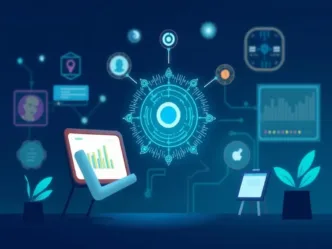What is organizational leadership is the critical force that shapes direction, ignites passion, and drives collective success.
Leading the Charge: Understanding What is Organizational Leadership?
In the dynamic and ever-evolving landscape of the modern workplace, the term “leadership” is frequently bandied about. But what truly distinguishes effective leadership within an organizational context? More than just holding a title or wielding authority, It’s the art and science of guiding individuals and teams towards a shared vision, fostering a thriving environment where innovation flourishes and goals are not just met but exceeded.
Organizational leadership is not confined to the C-suite or upper management. It permeates all levels of a successful organization, empowering individuals to take initiative, inspire their peers, and contribute meaningfully to the overall mission. It’s about cultivating a culture where leadership is distributed, and where every team member feels a sense of ownership and responsibility for the collective outcome.
At its core, what is organizational leadership is about influence – the ability to positively impact the actions, attitudes, and beliefs of others within the organizational framework. It’s about building trust, fostering collaboration, and empowering individuals to reach their full potential. It’s a dynamic process that requires adaptability, empathy, and a commitment to continuous growth.
Think of a ship navigating turbulent waters. While the captain holds the helm, it’s the collective effort, skill, and leadership of the entire crew that ensures a safe and successful voyage. Similarly, in an organization, effective leadership at all levels is crucial for navigating challenges, seizing opportunities, and ultimately achieving long-term sustainability.
Delving Deeper: Defining Organizational Leadership
To truly understand what is organizational leadership, we need to move beyond simplistic definitions. It’s a multifaceted concept encompassing several key elements:
- Visionary Direction: Leaders articulate a compelling vision for the future, painting a clear picture of where the organization headed and inspiring others to buy into that direction. This vision acts as a compass, guiding strategic decisions and motivating individuals to contribute towards a common goal.
- Strategic Thinking: Organizational leaders possess the ability to analyze complex situations, anticipate future trends, and develop effective strategies to achieve the organizational vision. This involves identifying opportunities, mitigating risks, and making informed decisions that align with the overall objectives.
- People Development: Great leaders recognize that their greatest asset is their people. They invest in developing the skills and capabilities of their team members, providing opportunities for growth, and fostering a culture of continuous learning.
- Empowerment and Accountability: Effective organizational leadership involves empowering individuals to take ownership of their work and make decisions within their areas of expertise. Simultaneously, it establishes clear accountability for results, fostering a culture of responsibility and high performance.
- Ethical Conduct and Integrity: Leadership without integrity is hollow. Organizational leaders set the ethical tone for the entire organization, acting as role models for honesty, fairness, and transparency. This builds trust and fosters a culture of ethical decision-making.
- Communication and Collaboration: Clear and effective communication is the lifeblood of any successful organization. Leaders skilled communicators, able to articulate their vision, provide constructive feedback, and foster open dialogue. They also facilitate collaboration across teams and departments, breaking down silos and encouraging shared problem-solving.
Key Characteristics of Effective Organizational Leaders
While there’s no single mold for a perfect leader, certain characteristics consistently emerge in those who excel in organizational leadership.
- Self-Awareness: Understanding one’s strengths, weaknesses, values, and biases is fundamental to effective leadership.
- Empathy: The ability to understand and share the feelings of others is crucial for building strong relationships and fostering a supportive environment.
- Resilience: Navigating challenges and setbacks is inevitable. Resilient leaders can bounce back from adversity and maintain a positive outlook.
- Adaptability: The business environment is constantly changing. Effective leaders are flexible and adaptable, able to adjust their approach as needed.
- Decisiveness: Making timely and informed decisions is a critical leadership skill.
- Influence: The ability to persuade and motivate others towards a common goal is a hallmark of strong leadership.
- Passion and Enthusiasm: Leaders who are passionate about their work and the organization’s mission inspire others to share that enthusiasm.
Distinguishing Organizational Leadership from Management
While often used interchangeably, organizational leadership and management are distinct but complementary concepts. Understanding the difference is crucial to appreciating what is organizational leadership.
| Feature | Management | Organizational Leadership |
|---|---|---|
| Focus | Maintaining order and efficiency | Setting direction and inspiring change |
| Role | Planning, organizing, controlling | Visioning, influencing, motivating |
| Approach | Transactional, task-oriented | Transformational, people-oriented |
| Power Source | Position, authority | Influence, trust |
| Goal | Stability, predictability | Growth, innovation |
| Question Asked | How can we do things right? | What are the right things to do? |
| Style | Directing, supervising | Coaching, mentoring |
| Time Horizon | Short-term, day-to-day operations | Long-term, strategic direction |
This table highlights that while management focuses on the execution of tasks and maintaining operational efficiency, organizational leadership focuses on the strategic direction and inspiring individuals to achieve a shared vision. Effective organizations require both strong management and impactful leadership.
The Benefits of Strong Organizational Leadership
Investing in developing organizational leadership capabilities yields significant benefits:
- Increased Employee Engagement and Motivation: Inspired employees are more engaged, productive, and committed to the organization’s success.
- Improved Innovation and Creativity: A culture of strong leadership fosters psychological safety, encouraging employees to take risks and share innovative ideas.
- Enhanced Organizational Performance: Clear direction, motivated employees, and effective strategies translate into improved financial performance and overall success.
- Stronger Organizational Culture: Leaders shape the values and norms of the organization, creating a positive and productive work environment.
- Greater Adaptability and Resilience: Organizations with strong leadership better equipped to navigate change and overcome challenges.
- Attracting and Retaining Top Talent: People are drawn to organizations with strong leadership and opportunities for growth.
Developing Organizational Leadership Skills
Leadership is not an innate quality; it can learned and developed. Here are some ways to cultivate organizational leadership skills:
- Seek Feedback and Self-Reflection: Actively solicit feedback from others and engage in self-reflection to identify areas for improvement.
- Embrace Learning and Development Opportunities: Participate in leadership training programs, workshops, and mentorship opportunities.
- Practice Active Listening and Empathy: Develop your ability to understand and connect with others.
- Take Initiative and Seek Challenges: Step outside your comfort zone and take on new responsibilities.
- Develop Your Communication Skills: Practice clear and effective communication in both written and verbal forms.
- Build Strong Relationships: Invest in building trust and rapport with your colleagues.
- Lead by Example: Model the behaviors and values you want to see in others.
The Future of Organizational Leadership
The demands on organizational leaders are constantly evolving. In today’s complex and fast-paced world, leaders need to be:
- Agile and Adaptable: Ready to respond quickly to changing circumstances.
- Digitally Savvy: Comfortable navigating and leveraging technology.
- Globally Minded: Understanding and appreciating diverse perspectives and cultures.
- Focused on Purpose: Connecting the organization’s work to a larger societal impact.
- Collaborative and Inclusive: Fostering environments where diverse voices are heard and valued.
In Conclusion:
What is organizational leadership? It’s the lifeblood of any thriving organization. It’s the driving force behind innovation, engagement, and ultimately, success. It’s a dynamic and evolving process that requires a blend of vision, strategy, empathy, and a commitment to empowering others. By understanding its core principles and actively developing leadership skills at all levels, organizations can unlock their full potential and navigate the complexities of the modern world with confidence and purpose. It’s not just about leading people; it’s about leading them towards a brighter future, together.






